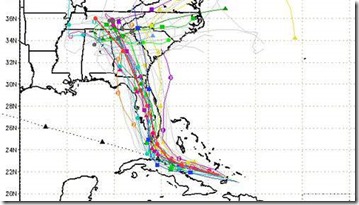Oh where oh where will she go?
Narratives and Fake News
With all the talk of fake news, it is easy to overlook fake weather and sports stories. They too have a narrative that becomes the story rather than a set of facts that tells a story. The narrative of last year’s election was the coronation of Hillary Clinton. Sure no one liked her but she couldn’t lose. Sports narratives too are commonplace. ESPN makes a living at them. They get so caught up in the narrative about a player, team or league that they lose sight of the game. Maybe it’s because ESPN cares more about politics than sports these days.
Fake weather is a version of fake news. It usually has to do with the political narrative called climate change. Hurricane Harvey brought so much rain to Texas that zealots maintained the cause must be climate change. Never mind that hurricane experts debunked them with numerous worldwide instances of stalled depressions. Undaunted, they just set to work on another chapter titled Irma. Here’s a particular egregious example of the trend: http://www.rollingstone.com/culture/features/hurricane-irma-is-on-track-to-change-the-course-of-florida-history-w502128
Irma was no more than a gleam in a weatherman’s eye, a wave off Africa, when ominous talk began about her being the ONE that could destroy Florida and all life there as we know it. As Irma grew, the Weather Channel (owned by that paragon of objective reporting that gave us MSNBC) breathlessly touted their little girl. They were like parents who text their kids’ latest selfies or send you videos of their recitals. They even created a new level for her— category 6! She would be a star, knock them dead in Florida and put Miami under water. And for a while, Irma did wreak havoc on unfortunate islands such as Barbuda, St. Maarten and Puerto Rico. Surely, she would achieve even more in the USA.
Exaggerated Prognostications
In the old days, Americans waited to see where a hurricane was going before worrying about it. But that won’t do any longer. Now every weather possibility becomes a ticking bomb with everyone glued to the screen awaiting the doom. Before the Florida governor could order evacuations (seems ages ago), the president had tweeted his love and support for Florida. British papers like the Guardian and the Daily Mail got in on the act. Miss Irma was the very European model of a modern major hurricane. It was the nightmare scenario, the days and weeks and months and years after tomorrow! Irma was going to destroy Miami, Fort Lauderdale, Cape Canaveral, Saint Augustine, Jacksonville, Savannah and Charleston one by one. And it wasn’t a matter of if but when.
Consequently every bit of good news about the massive storm got downplayed or ignored. It wasn’t supposed to hit Cuba, and when it did, the storm weakened. It didn’t travel up the more populous East Coast but turned into the cooler Gulf side where dryer air and wind shear weakened it further. One wall of the hurricane collapsed, and when it finally made landfall, it rapidly downgraded to a category 2 and then to a 1. These fortuitous events were met with more gloom: Irma will re-strengthen, the Keys will be inundated, Tampa Bay will be unprepared, the storm may linger off shore. The Media that had hoped to show pictures of utter devastation were reduced to showing the usual aftermath of a hurricane, e.g., downed trees, power lines and coastal flooding (or looters who took advantage of evacuated cities).
Hurricanes By Proxy
The hyperbole was bad enough in coastal Florida where the hurricane was a potential catastrophe, but inland areas got a mandatory invitation to the disaster too. As the weakened storm headed toward Georgia (networks would say “hurled”), forecasters predicted it would remain a tropical storm for a considerable time. This is still a very, very dangerous storm! Meteorologist James Spann, who is practically a secular saint in Birmingham, had calmly said for days that there was little about which to worry as his viewers were on “the good side” of the storm. He confidently predicted some wind and rain. But his sane forecasts were a waste of air time.
When Alabama’s governor declared a “state of emergency” for counties that border southern Georgia, a supposedly routine action to free up resources to cope with possible damage, the frenzy began in earnest. Auburn University led the way by announcing they would not risk having classes on Monday. Other schools and colleges in east Alabama followed. All well and good, but it did not stop there. The Media never bothers to differentiate between a state of emergency for certain counties and the rest of Alabama. And government officials don’t seem eager to set the record straight perhaps because of their self-importance or their desire to be seen protecting constituencies. No doubt they figure they won’t be penalized for over-reacting. Thus emergencies anywhere are now emergencies everywhere.
Somehow it became customary that whenever the governor makes such declarations, schools that find it necessary to close are exempt from making up the lost days as State law requires. Unsurprisingly, almost every school board in Alabama found it necessary to cancel classes for Monday (and many for Tuesday as well). They hurried to make these pronouncements even as it became apparent that they weren’t necessary at all. Wind speeds in the Florida peninsula and Georgia simply did not live up to the predictions. Everyone conveniently forgot the cool dry air mass, unusual for early September, that covered the State. So as originally predicted, temperatures stayed low, light rain fell and winds were never especially high.
School closings for dubious weather emergencies are the new normal. The cliché one hears is “out of an abundance of caution”. They certainly make it abundantly clear that school is an option. Nowadays, school is routinely suspended for moderate tornado and snow threats with the result that students often sit at home watching the rain. Now they’ve freshened it up to include breezy winds. And since schools introduced collaborative learning with less individual work, no studying and little learning, students really don’t miss much other than free meals. Of course, parents may have to skip work to mind their children while they all watch the gentle rain fall from Heaven, but it’s quality family time. Forget the old virtue when school was the moral equivalent of work and instilled the discipline one would later need on the job. Now everyone can stay home together — Workers and Students of the World, Unite!
Stop the Insanity!
Cyclones by themselves are scary and dangerous, and there will too often be death and destruction. However, when the narrative overtakes the reality just for ratings and profits, it crosses the line into fake news. False alarms will make people reluctant to heed warnings when there is actual danger. During the Harvey floods, broadcasters tried in vain to find words to describe the massive inundation. Years of exaggerating thunderstorms and a few inches of rain had left them speechless in a real calamity. So they just repeated a litany of “this is really, really, really serious”. Isn’t it time to save severe warnings for the times and places where there is “really, really, really” bad weather?




